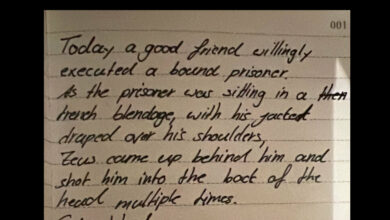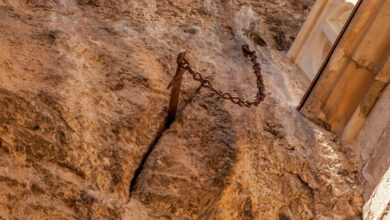The center collapses in France, leaving Macron stranded

An era has passed in France.
President Emmanuel Macron’s seven-year dominance of national politics ended Sunday with his party’s overwhelming defeat in the first round of parliamentary elections. Not only did he dissolve parliament by calling an emergency vote, he effectively dissolved the centrist movement known as “Macronism.”
The far-right National Rally, which won a third of the vote, did not guarantee that it would win an absolute majority in a second round in six days’ time, although it will probably come close. But Mr Macron, who risked everything by calling the election, did guarantee that he would ultimately be marginalised, with perhaps no more than a third of the seats his party now holds.
“The decision to dissolve the National Assembly has in fact put an end to the political configuration that emerged from the 2017 presidential elections,” said Édouard Philippe, one of Macron’s former prime ministers.
In 2017, Mr. Macron, then 39, came to power and crushed the center-right Gaullists and center-left Socialists, the pillars of postwar France, in the name of a 21st-century realignment around a pragmatic center. It worked for a while, but increasingly, as Mr. Macron has failed to build a credible moderate political party, the result is one man and a shrinking circle of allies opposing the extremes of right and left.
That position, which at times served Macron well, has now collapsed in one of the most high-profile self-inflicted debacles in recent European politics.
Mr. Macron did not have to call an election just weeks before the Paris Olympics, even though the Rassemblement National defeated him in the European parliamentary elections. It is a measure of the desperate situation in which France finds itself today that a narrow victory for Mr. Macron would now be defined as keeping the Rassemblement National, led by Marine Le Pen, from an absolute majority in the National Assembly, even if the price is unmanageable chaos.
“They are finished,” Luc Rouban, a senior research fellow at Sciences Po University in Paris, said of Macron’s centrist move. “I don’t see any room for manoeuvre for them.”
France, unlike Italy or Belgium, does not have a culture of living in limbo without an appointed government for long periods. But that possibility now looms.
If the Rassemblement National wins an absolute majority, Mr. Macron will almost certainly have to live with Ms. Le Pen’s protégé, Jordan Bardella, 28, as his prime minister, since that party would topple anyone else. But Mr. Macron and Mr. Bardella — with opposing views — would find themselves in an uneasy partnership.
If there is no National Rally majority, Mr Macron will have to deal with a very large far-right group and a large left and far-left alliance in the Assembly, all of whom are strongly opposed to him. It is unclear how he would form a governing coalition. The only possibility would be some form of interim government, led by technocrats, pending a further dissolution of the Assembly in a year, when the Constitution would allow it again.
According to a report by the National Rassemblement Commission, the National Rassemblement Council and its allies qualified for the second round of voting in more than 480 districts and were leading or directly elected in 297 of them. analysis of the results by Franceinfo. Macron’s centrist coalition, by contrast, stands to lose many of the 250 seats it has held since 2022, qualifying for the second round in 319 districts and leading or directly elected in only 69 of them. A party needs 289 seats to have an outright majority in the Assembly.
Macron’s Renaissance party urged its candidates to withdraw from a number of constituency races where they finished third in the first round. The aim is to avoid splitting the vote and thus preventing the far right from gaining an outright majority.
But, in yet another sign of division, there are centrists who are reluctant to support the left, seeing it as a disastrous economic program and the statements of Jean-Luc Mélenchon, the leader of the far left, whose passionate support for the Palestinian cause more than once seems to cross the line into anti-Semitism.
“Nobody chose this dissolution,” Gabriel Attal, the outgoing prime minister who was once a favorite of Macron, said emphatically on Monday. “But I refuse to let us be the victims.”
Macron, whose term expires and who is due to step down in 2027, will remain president. If Bardella becomes prime minister, he will undoubtedly position himself as the surviving line of defense against the far right, which views immigrants as second-class.
But his authority over domestic policy will be limited and his voice on the international stage, traditionally the exclusive domain of French presidents, will diminish, particularly with regard to the European Union, where the eurosceptic Rassemblement National will do what it can to return power from Brussels to the nation. Mr. Macron has been a fervent advocate of what he calls “European power.”
It was notable that both Ms Le Pen and Mr Bardella chose to deliver their victory speeches on Sunday against the backdrop of the French flag, without the blue and gold flag of the European Union that hangs from every city hall and government office in France, including the prime minister’s residence, the Hôtel de Matignon, and the president’s Élysée Palace. The message that international priorities are shifting was unmistakable.
Why then did Macron call for elections?
It seems clear that he misjudged himself, particularly with regard to the left, which he thought would split between moderate socialists and Mr. Mélenchon’s France Unbowed, increasing the chances of his own party qualifying for the second round. That split never happened. Instead, the New Popular Front coalition of those left-wing parties won 27.99 percent of the vote to Mr. Macron’s 20.04 percent, securing a place in many more second rounds.
A second miscalculation was that Mr. Macron believed he could still be a unifying figure, while hostility toward him had been steadily growing during his seven-year presidency. He wanted to embody the Republic and its values against the extremes. Too few voters were prepared to buy that.
Instead, they seem to have felt alienated by his perceived aloofness and highly personal reign, typified by the shocking decision to call elections, which broke the long-standing taboo against the National Rally.
“This was a personal rejection,” said Jacques Rupnik, a political scientist. “People no longer want Macron to bring them together.”
If that is true, as it seems, it would be a serious blow to Mr Macron. A highly intelligent man, with a wink and charm, he has always seen himself as someone who can convince everyone from President Vladimir V. Putin of Russia to former US President Donald J. Trump to agree with him. It has not always worked, but his bold determination to break down political barriers has never wavered.
He spoke to Putin for months after the outbreak of war in Ukraine in 2022, when almost no one else in the West would do so. This year he would not rule out putting Western troops on the ground in Ukraine, when almost everyone, led by President Biden, rejected the idea. He declared that Europe was facing “death” if it did not begin to emancipate itself from the United States, while many other European states thought that increasing the distance between the allies would sound the death knell. In the end, advised by a small clique, he called these elections to the surprise of many of his own ministers, who saw it as a near-suicidal move.
“Macron thought the house would burn down in three years,” said Nicole Bacharan, an author and political scientist, referring to the possibility that Ms. Le Pen would be elected in the 2027 presidential election. “So let’s burn it down now. Then we’ll see.”
France is a country with strong institutions and deep democratic traditions, supported by the rule of law. It does not burn easily, and will not do so. As a permanent member of the United Nations Security Council and a nuclear power, it has an important place in international affairs that will continue to exist, even if domestic problems affect it to some extent.
The economy, thanks in part to Macron’s policies, has attracted huge foreign investment in recent years and unemployment has fallen. Even though public debt and budget deficits have risen to levels that alarmed both the European Commission and rating agencies, economic vitality seems greater than that of a troubled Germany. No one driving through France sees a country on the brink of the abyss.
Yet Mr. Macron has led France to a dangerous turning point. There was a reason why a political barrier was long erected against the Rassemblement National, with its quasi-fascist history (now disavowed) and its enduring belief that immigrants dilute the essence of the French nation. The party provokes extreme reactions and disturbing memories of the wartime collaborationist Vichy government.
Many members of France’s large Muslim minority, estimated at around five million, fear the rule of the National Rally. A general sense of deep uncertainty has descended on France.
“Setting a house on fire is dangerous,” said Ms. Bacharan, “and Mr. Macron should have known that.”




